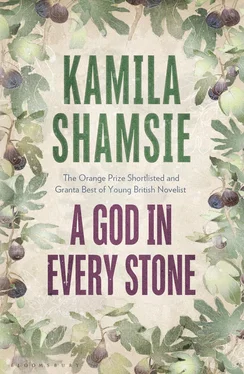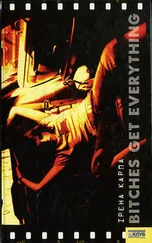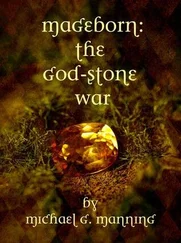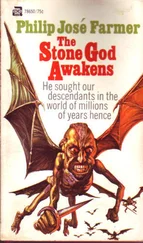Military pickets remained in place but no one was attempting to stop or question passers-by any longer, and the numbers out on the street were greater than earlier in the day. Unaccustomed to car travel, Qayyum braced his hands against the dashboard. Speed blurred the night sounds together, only the muezzin’s call for Isha prayers remaining distinct. The Khilafat offices were closed, no light seeping from beneath doors or through windows, but Abdul Hakim didn’t even slow, as if he already knew there was no one there, and continued driving in silence through the Walled City. Perhaps he had no destination; perhaps they would drive and drive in circles, for ever on their way to the place where the bodies were laid out, and while they circled Najeeb would be neither alive nor dead.
The muezzin’s voice rose higher. His words, stitched into the air of the Walled City, were a challenge, not a lament. Every morning Qayyum greeted the day by swearing the oath of the Khudai Khidmatgar: In the name of God who is Present and Evident, I am a Khudai Khidmatgar. I will serve the nation without any self-interest. I will serve people without regard to their religion or faith. I will not take revenge and my actions will not be a burden for anyone. My actions will be non-violent. I will make every sacrifice required of me to stay on this path.
The muezzin’s voice — Ash-hadu-anna; I bear witness — turned the oath into a provocation. Why swear to God using the word ‘sacrifice’? Which man had it in him to be Ibrahim? In a field a rabbit with sewn lips thrashed in the grass, its dying breaths drawn alone.
— Nearly there now, the lawyer said, turning into a street only just wide enough for his car. Almost immediately, he braked. A press of people was gathered outside the front door of a house Qayyum recognised as belonging to a municipal commissioner who was also one of the notable figures of the Khilafat Committee. One man was knocking on the door, a rhythmic repetition to the action which suggested he’d been doing so for a while; the other men — and two women — stood silently, looking up at the shuttered windows.
— So much for secrecy, the lawyer said, reversing out and driving a short distance to the parallel street.
Here he knocked on the door of the house which backed onto the Municipal Commissioner’s house, and whispered a few words to the broken-nosed man who answered. The man stood to one side and gestured towards the stairs which Qayyum and Abdul Hakim climbed up to the roof. Overhead, a low-hanging moon, clustered stars. A row of bulrushes planted in troughs separated the broken-nosed man’s roof from the Commissioner’s, their spiked tips etched in sharp relief against the sky. Together Qayyum and the lawyer moved one of the troughs — a metallic scraping sound — and entered the property of the Municipal Commissioner.
He was standing alone at the edge of his roof, looking through the narrow slit between the khus mats which formed a wall facing the street.
— They won’t go away until you tell them what they need to know, Abdul Hakim said. The Commissioner turned sharply, though it seemed impossible he hadn’t heard the sound of the trough being moved, and was visibly relieved to see the Congresswalla and the Khudai Khidmatgar.
— What can I tell them? I don’t know where they took them.
— Qayyum Gul’s brother has been missing since yesterday.
Abdul Hakim pushed Qayyum forward slightly, and the Commissioner raised his hands, palms facing Qayyum as if to say, I’m defenceless, you can’t attack me.
— He was in a frock-coat. Have you seen him?
— A frock-coat, no. No, there was no one in a frock-coat. I swear on the Qur’an. I would have remembered that.
The Commissioner’s manner changed after that, becoming more confident, almost avuncular. He placed an arm around Qayyum’s shoulder, and said, He’s probably been arrested, so many have. We’ll go tomorrow to the Kabuli Gate police-thana and find him. I’ll come with you.
The relief of an explanation was dizzying. Qayyum wanted to embrace the older man, who he decided he must have loved and admired for years. This stalwart of the city. This sage who walked among the powerful and used his influence for those who had none. How fortunate it was to live in an age which demanded the best from the best, and allowed them to illuminate the world.
— Go downstairs and tell those people you’ll find their brothers and sons as well, Abdul Hakim said, sitting on the lip of a trough so the bulrushes formed the high back of a throne of gold behind him.
— Do you think I had a choice? the Municipal Commissioner said.
— No? Explain it to me. Explain it to Qayyum Gul who has spent all day looking for a man who can’t be found.
Qayyum wanted only to return home with his relief and tell his sisters and nieces and nephews and brothers-in-law that they would find Najeeb tomorrow, and tease him about the English frock-coat which couldn’t keep him from being thrown into prison. He walked over to the khus mats, looked through a gap between them at the street below. The numbers seemed to have grown, and someone had taken the place of the man knocking on the door, without disrupting the rhythmic thud-thud thud-thud. Across the street, someone opened a window and said, Enough now, enough! and one of the women below cried out, Where is my son?
— Tell me what else I could have done, the Municipal Commissioner said. Caroe called us together — four of us — and said we had to hand over the bodies. The ones in the Khilafat offices, the ones in the Madrassa, all of them. Do you think he phrased it as a request?
— What?
— Now you hear the truth, Qayyum Gul, the lawyer said. Go on, Mr Commissioner, tell us how you tried to resist. Tell us you said take me to prison, put a bullet through my brain, but I will not be a part of this shameful, criminal act.
The Municipal Commissioner winced at the bite of the word ‘Mr’, but the rest of the sentence had him flicking his hand at the lawyer, dismissing him.
— What do you understand of it, Abdul Hakim? Caroe was right; he said if there’s a mass funeral tomorrow no one — not the Congress, not the Khilafat Committee, not Gandhi and Ghaffar together if they were here — will be able to control the passions of the city. Haven’t we had enough bloodshed already?
— Oh, oh, listen to him! He was acting in Peshawar’s best interests. Oh Qayyum Gul, are you witnessing this?
— Remember Chauri Chaura, the Municipal Commissioner said, his voice stern, reminding the two other men that he was the oldest here. After your Congress volunteers burnt the police station Gandhi called off the entire Non-Cooperation Movement. Do you want something like that to happen again? Here? So that all the rest of India, all the Congress officials, can say those savage men of the Frontier! How can we trust them to be part of a movement of non-violence?
Abdul Hakim spread his hands in Qayyum’s direction as if to say, Can you believe this?
— I don’t understand. What did they do with the bodies? Qayyum asked.
The lawyer made a sound which would have been a laugh if it had contained any humour.
— Probably threw them into the nearest river or in some ditch somewhere.
— Don’t start these ridiculous rumours! They were buried according to full Muslim rites. Caroe swore that.
— What, even the ones who weren’t Muslim?
— Enough, Qayyum said, holding up his hand. His voice was ragged with anger when he said to the Municipal Commissioner, Those people down there, they want to bury their dead. Some way could have been found to allow them to do that.
— Really? said the Municipal Commissioner. You think after a day like yesterday Peshawari men would quietly walk behind row after row of shrouded bodies, including the body of a young girl shot dead by an English bullet. And not just any young girl. The angel on the Street of Storytellers. You should have seen the men in the office when she was brought in, the ones who recognised her particularly. I thought their hearts would burst right there.
Читать дальше












